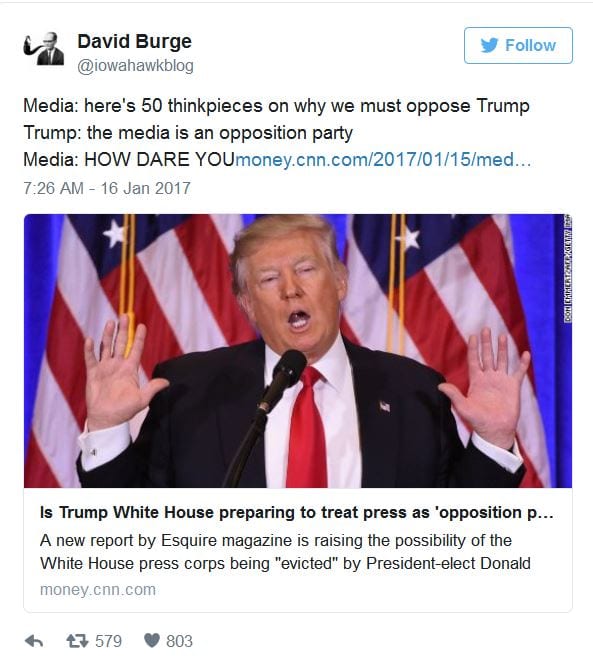PAST PERFORMANCE IS NO GUARANTEE OF FUTURE RESULTS:
Shot:
In 1993, novelist Michael Crichton riled the news business with a Wired magazine essay titled “Mediasaurus,” in which he prophesied the death of the mass media—specifically the New York Times and the commercial networks. “Vanished, without a trace,” he wrote.
The mediasaurs had about a decade to live, he wrote, before technological advances—”artificial intelligence agents roaming the databases, downloading stuff I am interested in, and assembling for me a front page”—swept them under. Shedding no tears, Crichton wrote that the shoddy mass media deserved its deadly fate.
“[T]he American media produce a product of very poor quality,” he lectured. “Its information is not reliable, it has too much chrome and glitz, its doors rattle, it breaks down almost immediately, and it’s sold without warranty. It’s flashy but it’s basically junk.”
* * * * * * * * *
As we pass his prediction’s 15-year anniversary, I’ve got to declare advantage Crichton. Rot afflicts the newspaper industry, which is shedding staff, circulation, and revenues. It’s gotten so bad in newspaperville that some people want Google to buy the Times and run it as a charity! Evening news viewership continues to evaporate, and while the mass media aren’t going extinct tomorrow, Crichton’s original observations about the media future now ring more true than false. Ask any journalist.
—“Michael Crichton, Vindicated, His 1993 prediction of mass-media extinction now looks on target,” Jack Shafer, Slate, May 29, 2008.
Chaser:
In his own way, Trump has set us free. Reporters must treat Inauguration Day as a kind of Liberation Day to explore news outside the usual Washington circles. He has been explicit in his disdain for the press and his dislike for press conferences, prickly to the nth degree about being challenged and known for his vindictive way with those who cross him. So, forget about the White House press room. It’s time to circle behind enemy lines.
Washington reporting has long depended on a transactional relationship between sources and journalists. Journalists groom sources, but sources also groom journalists. There’s nothing inherently unethical about the back-scratching. When a reporter calls an administration source to confirm an embarrassing item, the source may agree to confirm as long as the reporter at the very least agrees to listen sympathetically to the administration’s context. But Trump’s hostile attitude toward the press, his dismissal of CNN for attempting to ask a question at the last conference, and his underhanded ploy at the last conference where he loaded the audience with cheerleaders has muted that mutualism. It’s easy to predict that instead of negotiating with reporters as equals, his administration will advance its agenda by feeding more pliant reporters material the way a trainer rewards circus animals.
—“Trump Is Making Journalism Great Again,” Jack Shafer, the Politico, today.
Related: “OUCH! IowaHawk burns media, aka ‘the opposition party’, with their OWN words and stats:”

Just think of the MSM as Democrat operatives, and it all makes sense – not least of which, their extended hibernation between November of 2008 and November of 2016.
UPDATE: And speaking of that extended hibernation, Michael Ramirez illustrates it as only he can: “Rip Van Reporter.”
